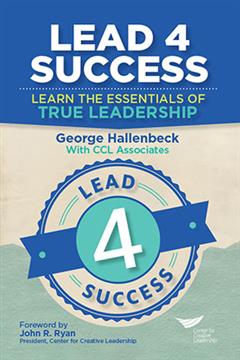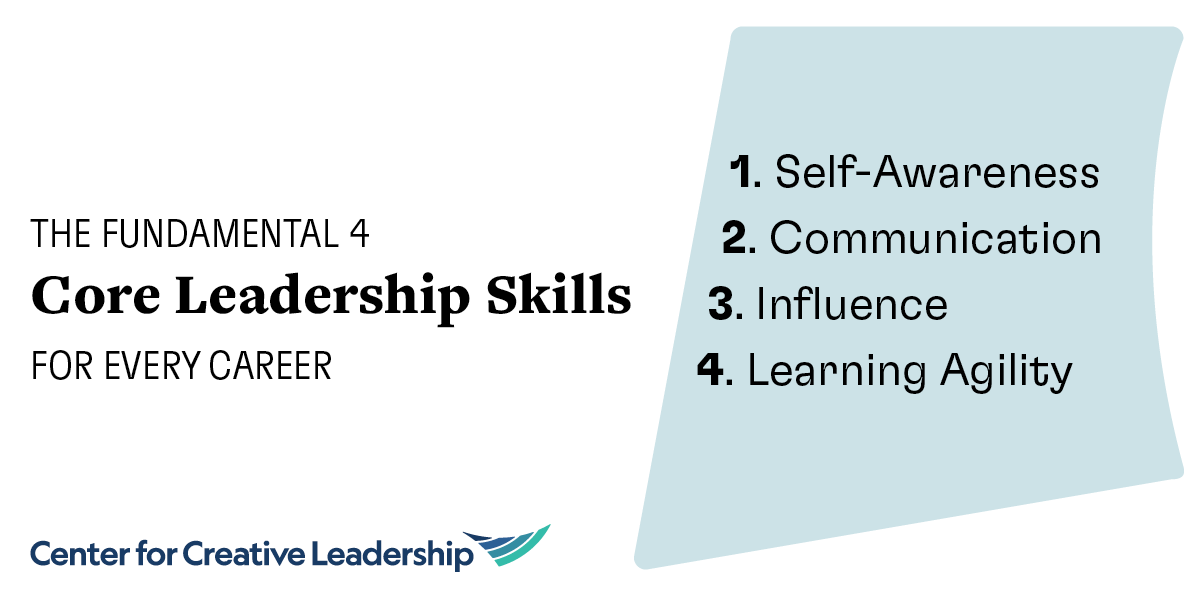Leaders at different levels of an organization face different challenges. But whether you’re an individual contributor, a frontline manager, a mid-level leader, a senior executive, or somewhere in between, there are 4 core leadership skills you need to focus on as you grow in your career.
These are the timeless, fundamental skills that are needed by leaders throughout every organization — and they’re important regardless of role, industry, or location.
But the way you address each core leadership skill, and what you need to learn or emphasize around it, will shift and change as you move into higher levels in the organizational hierarchy and encounter new leadership challenges.
So what exactly are these foundational leadership skills? While there may not be a single definitive list of core leadership skills, at CCL, we call the core leadership skills needed in every role and career “The Fundamental 4.”
The Fundamental Leadership Skills Needed in Every Career
The “Fundamental 4” Leadership Skills
At CCL, we see the 4 core leadership skills as:
1. Self-Awareness.
Simply put, knowing and leading yourself is key to becoming as effective as possible at leading others. But gaining greater self-awareness is anything but simple. It takes intentional effort to assess your natural abilities and development opportunities; determine how to maximize your strengths and compensate for your weaknesses; and recognize your own values, biases, and perspectives.
Taking the time to reflect on these things and consider how you’ve been shaped by your background and social identity builds greater self-awareness. And ultimately, greater awareness about yourself as a person will make you a better leader. If you’re not sure where to start, here are 4 sure-fire ways to boost your self-awareness.
2. Communication.
Communication is one of the most basic, across-the-board leadership skills that all of us need to develop and refine during our careers. “Communicating information and ideas” is consistently rated among the most important leadership competencies for leaders to be successful. Communication is also embedded in a number of other core leadership skills, including “leading employees,” “participative management,” and “building and mending relationships.”
Writing clearly, speaking with clarity, and active listening skills are all part of the core leader competencies related to effective communication. And as you move up the career ladder, communication in leadership roles expands to behaviors such as encouraging discussion, building trust, conveying vision and strategic intent, and pulling people along with you. At every leader level, communication is a critically important skill.
3. Influence.
Developing your influencing and leadership skills helps you to communicate your vision and goals, align the efforts of others, and build commitment from people at all levels.
Influence can vary greatly at different levels in the organization. Knowing your stakeholders, or audience, is key. Do you need to influence your boss? Your peers? Direct reports? Customers? Each stakeholder has special concerns and issues, so consider the most appropriate ways of influencing others for your particular situation.
Early in your career, or in individual contributor roles, influence is about working effectively with people over whom you have no authority. It requires being able to present logical and compelling arguments and engaging in give-and-take. Later on, or in more senior-level or executive roles, influential leadership skills are focused more on steering long-range objectives, inspiration, and motivation. But throughout your career, influence remains a core leadership skill. Ultimately, influence allows you to get to the business of getting things done and achieving desirable outcomes.
4. Learning Agility.
To develop as leaders and as people, we need to be active, agile learners. Leaders need to be in a mode of constant learning, valuing and seeking out experiences to fuel leadership development, and recognizing when new behaviors, leadership skills, or attitudes are required — and accepting responsibility for developing those.
Learning agility is critical for career longevity, and it involves learning from mistakes, asking insightful questions, and being open to feedback. It also includes learning new skills quickly, being open to learning from hardships and taking advantage of opportunities to learn from heat experiences, and responding well to new situations.
For senior leaders, learning agility is also about inspiring learning in others and creating a learning culture throughout the organization.

Set your development as a leader on the right track by learning and practicing core leader competencies and the 4 foundational leadership skills of self-awareness, communication, influence, and learning agility.
How to Grow the Core Leadership Skills
Developing Foundational Leadership Skills to Prepare for Every Role
If you’re thinking about adding the Fundamental 4 to your leadership skills list, keep in mind that each skill should be continuously improved, or “built on as you go.” To be effective, you must continue to develop, adapt, and strengthen these core leadership skills throughout your career — because the learning never ends. As you gain leadership skills in one area, you’ll find there’s even more to learn and practice in taking on new challenges and larger roles.
And if you think you’ve “skipped over” any of the Fundamental 4 core leadership skills during your career, you won’t be as effective, or fully develop your leadership potential. The good news is that, with concerted effort, you can still develop any skills you missed out on; it’s never too late for soft skill development!
If you can identify any leadership gaps or weaknesses in your leadership journey, you have the potential to learn, grow, and change. With the foundational leadership competencies of self-awareness, communication, influence, and learning agility as the core of your leadership skills development, you can be confident that you’re building capacity for new opportunities and the next level of responsibility — because these 4 are core leadership skills needed for everyone, and every career stage.
Ready to Take the Next Step?
Partner with us to help your organization develop the4 fundamental leadership skills. Our leadership fundamentals course: Lead 4 Success®, helps grow core leader competencies for foundational leadership skills development.










